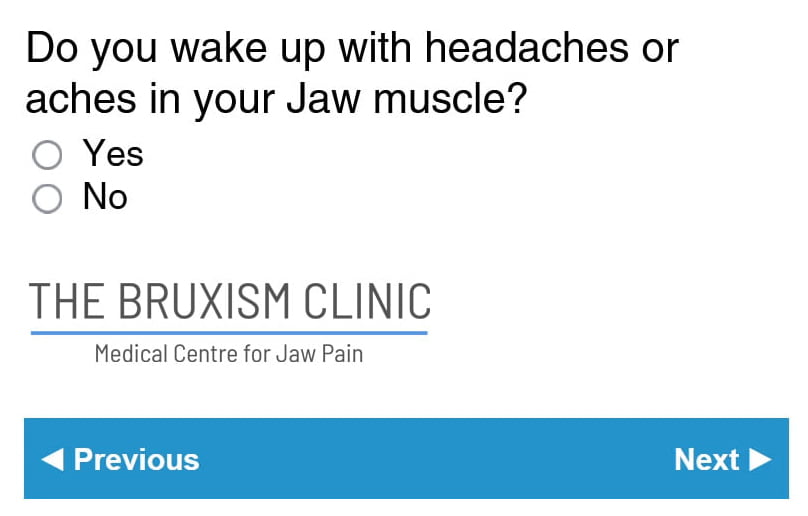GMC Registered Professionals
Award Winning Clinic
CQC Regulated
Easy Access and Parking




Do you experience jaw pain, clicking, or discomfort when speaking, chewing or yawning? Are you worried about the link between these symptoms and teeth grinding? Temporomandibular Joint (TMJ) disorder often goes hand-in-hand with bruxism, creating a complicated web of interconnected symptoms, causes, and treatments. In this enlightening guide, we will unravel the complexity of TMJ disorder and its relation to bruxism, providing you with the knowledge to understand, manage and treat both conditions effectively.
At The Bruxism Clinic, our goal is to educate and support individuals on their path to better oral health and well-being. By understanding the underlying causes of TMJ disorder and bruxism, you can make informed decisions about your treatment and take control of your dental and overall health. Let's embark on a journey of discovery together, unlocking the secrets of TMJ disorder and bruxism, and paving the way towards a healthier, pain-free life.
TMJ disorder refers to a range of conditions that affect the temporomandibular joint, the hinge-like structure connecting the lower jaw to the skull. Dysfunction in this joint can cause various symptoms such as jaw pain, difficulty in chewing, and restricted jaw movement. TMJ disorder can be caused by various factors, including genetics, trauma, poor posture, arthritis, and, importantly, bruxism.
Bruxism, which involves the habitual grinding and clenching of teeth, is thought to be a significant contributing factor in the development of TMJ disorder. Research has shown that individuals with bruxism are more likely to experience TMJ disorder symptoms. The excessive force placed on the teeth and jaw joint from grinding and clenching can cause wear and tear on the cartilage within the temporomandibular joint, leading to inflammation, pain, and restricted movement. Consequently, bruxism may both exacerbate existing TMJ disorder and increase the risk of developing this condition.
Some common symptoms of TMJ disorder include:
- Jaw pain or tenderness
- Restricted jaw movement or locking of the jaw
- Clicking or popping sounds when opening or closing the mouth
- Difficulty chewing or swallowing
- Earaches and ringing in the ears (tinnitus)
- Facial pain and swelling
- Headaches or migraines
It's crucial to recognise these symptoms and seek professional advice to determine whether they indicate issues with the temporomandibular joint or are solely due to bruxism.

There are various treatment options available for TMJ disorder and bruxism, ranging from conservative approaches to surgical interventions. Treatment will depend on the severity of the symptoms and the specific cause of the condition. Some effective treatments for both conditions include:
- Oral Appliances: Dental splints, mouth guards, or night guards can be custom-made to fit your mouth, providing a barrier between the upper and lower teeth. These appliances can help distribute the force from grinding and clenching more evenly, reducing wear and tear on the teeth and temporomandibular joint.
- Physical Therapy: Physical therapists can work with individuals to develop exercises that strengthen the jaw muscles, improve jaw joint mobility, and alleviate TMJ and bruxism symptoms. This may involve specific jaw movements, stretches, and massages to relax the muscles and increase joint flexibility.
- Medication: In some cases, over-the-counter pain relievers and anti-inflammatory medications can help manage pain and swelling associated with TMJ disorder and bruxism. Muscle relaxants may also be recommended for short-term use to alleviate muscle spasms and discomfort. It is essential to consult with a healthcare professional before starting any new medications.
- Stress Reduction Techniques: As stress and anxiety can be significant triggers for bruxism and exacerbate TMJ disorder symptoms, learning stress reduction techniques such as meditation, yoga, and deep breathing exercises can help manage both conditions.
- Botox for Bruxism and TMJ: Botox injections can be used as an off-label treatment to relax the overactive jaw muscles responsible for grinding and clenching. By doing so, Botox can provide relief from symptoms associated with both bruxism and TMJ disorder. It is important to note that Botox should only be administered for this purpose by a qualified healthcare professional experienced in treating bruxism and TMJ disorder.
- Surgery: In extreme cases where non-surgical treatment methods are unsuccessful, surgery may be necessary to correct the temporomandibular joint. This may involve arthroscopy, joint replacement, or other surgical procedures. Surgery should be considered as a last resort, and individuals should be thoroughly informed of the potential risks and benefits before undergoing any invasive procedure.
Successfully managing TMJ disorder and bruxism often requires a holistic approach, involving the collaboration of dental and healthcare professionals, as well as the individual's commitment to self-care. By understanding the complex relationship between these two conditions and implementing a combination of conservative treatments, stress reduction techniques, and appropriate medical interventions, it is possible to decrease symptoms, improve oral health, and enhance overall well-being.
 Book My Consultation
Book My ConsultationGaining a better understanding of the intricate relationship between TMJ disorder and bruxism empowers you to make informed decisions about your treatment and take proactive steps towards improving your oral health. At The Bruxism Clinic, our team of experienced professionals can help you navigate the complexities of these conditions and provide personalised care to address your specific needs.
Take control of your oral health and achieve relief from the debilitating symptoms of TMJ disorder and bruxism. Book a consultation at The Bruxism Clinic today, and begin your journey towards a healthier, pain-free life. Together, we can create a comprehensive bruxism treatment plan tailored to your unique circumstances, enabling you to enjoy the benefits of a brighter, more confident smile.
Speak to one of our expert clinicians today about how we can help with your Bruxism
GMC Registered Professionals
Award Winning Clinic
CQC Regulated
Easy Access and Parking
 Book My Consultation
Book My ConsultationThe Bruxism Clinic @ Dr Aesthetica
Unit 1,
1431 - 1433 Bristol Road South
Birmingham,
West Midlands
B31 2SU